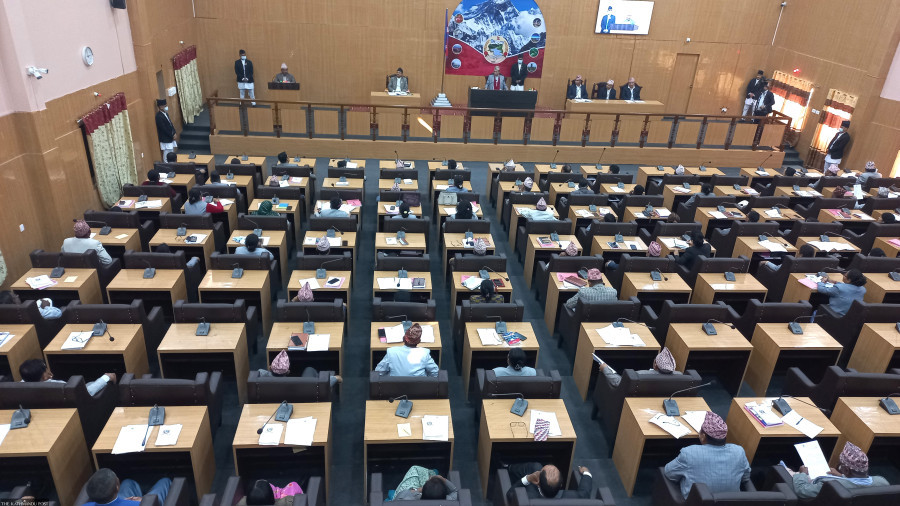Politics
Koshi Speaker: A powerful position no party wants
A tricky number game creates an unusual scenario where no side would want to lose a vote by claiming the post.
Nishan Khatiwada
On August 1, Koshi Province Speaker Baburam Gautam resigned from his post so that he could cast his vote to help the ruling coalition secure a majority required to form a new government. Since then the Speaker’s position in the province remains vacant, with no party willing to accept it. In normal times, political parties and lawmakers would be fighting tooth and nail to win the coveted position.
In this period, the Speaker’s position has become a tool of political bargaining in the province and by extension the federal politics. The tricky strength of the parties in the Koshi assembly means that none of them is vying for it now.
The ruling coalition’s decision to allow the right-wing Rastriya Prajatantra Party to lead a committee in the federal Parliament was viewed as a give-and-take deal. Leaders from the ruling CPN (Maoist Centre) had publicly claimed that they had “sacrificed” a parliamentary committee leadership position in exchange for the RPP’s support in Koshi government formation. But RPP chair Rajendra Lingden has denied any such agreement.
Speaking at the Tribhuvan International Airport upon his return from a foreign trip on Tuesday, Lingden said they were offered the Speaker position in Bagmati and Koshi in an earlier power-sharing deal, but they did not take the one in Koshi.
“I’d like to make it clear that while accepting the leadership of a parliamentary committee, we have not agreed to assume the Speaker’s position in Koshi and support the ruling coalition,” he said.
Nepali Congress’ provincial assembly leader Uddhav Thapa was appointed the chief minister of Koshi on August 1 following the resignation of Speaker Baburam Gautam. Gautam had resigned the post earlier in the day, ensuring the candidate from the alliance of parties a majority.
In the 93-strong assembly, among the opposition parties, UML has 40 seats (including the deputy Speaker) and RPP has six seats. Among the ruling parties, Nepali Congress has 29 lawmakers, Maoist Centre 14, CPN (Unified Socialist) four and Janata Samajbadi Party has one lawmaker.
Congress assembly leader Thapa claimed he had secured the vote of confidence after Congress’ Israil Mansuri, who was chairing the assembly, voted in his favour. Mansuri had chaired the assembly after the deputy Speaker Srijana Danuwar flew to Kathmandu on the floor test day, citing health reasons. Claiming that Mansuri’s vote was unconstitutional, UML parliamentary party leader and former chief minister Hikmat Karki moved the Supreme Court on Wednesday.
On Thursday, the top court issued an interim order saying that the vote of confidence was unconstitutional due to the participation of the member who chaired the meeting and asking the Thapa-led Cabinet not to take any decision with long-term implications.
Deputy Speaker Danuwar from the CPN-UML is currently presiding over the provincial assembly in the absence of the Speaker. Thus UML cannot take the position as per the constitution, which, among other things, bars a single party from assuming both the positions.
Article 182 (2) of the constitution states, “Election pursuant to clause (1) shall be so held that there is one woman out of the Speaker of Province and the Deputy Speaker of Province, and the Speaker of Province and the Deputy Speaker of Province shall be representatives from different parties.”
Similarly, Article 182 (3) states that in case the office of the Speaker of Province or the Deputy Speaker of Province becomes vacant, members of the Provincial Assembly shall fulfil the vacancy through election to the Speaker of Province or the Deputy Speaker of Province from among themselves.
The ruling parties hope that they will either get to take the vote of confidence again or form a government under Article 168(5), while UML cites Article 168(3) to form the government as the largest party.
At the same time, the ruling coalition is not willing to assume the Speaker position as it will put them in trouble while showing the majority.
Binod Rai, a Nepali Congress lawmaker in the Koshi assembly, said that the ruling coalition cannot take the Speaker position because they will fall short of majority during the government formation process either according to Article 168(2) or Article 168(5). “Maoist Speaker resigned the post to help the coalition secure a majority. Therefore, we will again fall short of majority if we assume the Speaker’s position,” he said.
Similarly, Maoist Centre parliamentary party leader Indra Angbo said as the court is yet to give a full verdict, the ruling coalition has not thought about the new Speaker as there is already the deputy Speaker for chairing the provincial assembly.
“Since the final verdict is still awaited, it is uncertain whether we will have to seek a vote of confidence again. Whether the UML deputy Speaker should have skipped the assembly meeting that day is, however, a different question altogether. But it is her constitutional duty to chair the assembly.”




 11.73°C Kathmandu
11.73°C Kathmandu















